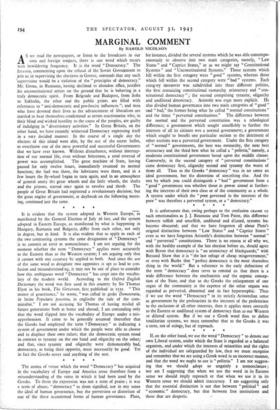MARGINAL COMMENT
By HAROLD NICOLSON
AS we read the newspapers, or listen to the broadcasts in our own and foreign tongues, there is one word which recurs with bewildering frequency. It is the word " Democracy." The Izvestia, commenting upon the refusal of the Soviet Government to join us in supervising the elections in Greece, contends that any such 'supervision would be a violation of the " principles of democracy." Mr. Groza, in Rumania, having declined to abandon office, justifies his unconstitutional action on the ground that he is behaving in a truly democratic spirit. From Belgrade and Budapest, from Sofia to Sakhalin, the ether and the public prints are filled with references to " anti-democratic and pro-fascist influences"; and men who have devoted their lives to the advancement of liberalism are startled to hear themselves condemned as arrant reactionaries who, in their blind and wicked hostility to the cause of the peoples, are guilty of indulging in " diversionary activities." In Great Britain, on the other hand, we have recently witnessed Democracy expressing itself in a very decided manner. In the course of a single day the electors of this island were able, by the use of the secret ballot, to overthrow one of the most powerful and successful Governments that we have ever known. Without disturbance, without interrup- tion of our normal life, even without bitterness, a total reversal of power was accomplished. The great machine of State, having paused for only twelve hours, immediately resumed its normal function; the fuel was there, the lubricants were there, and in a few hours the fly-wheel began to turn again, and in an atmosphere of general amity the great wheels and the little wheels, the shafts and the pistons, started once again to revolve and throb. The people of Great Britain had registered a revolutionary decision; but the great engine of government, at daybreak on the following morn- ing, continued just the same.
* * * *


























 Previous page
Previous page